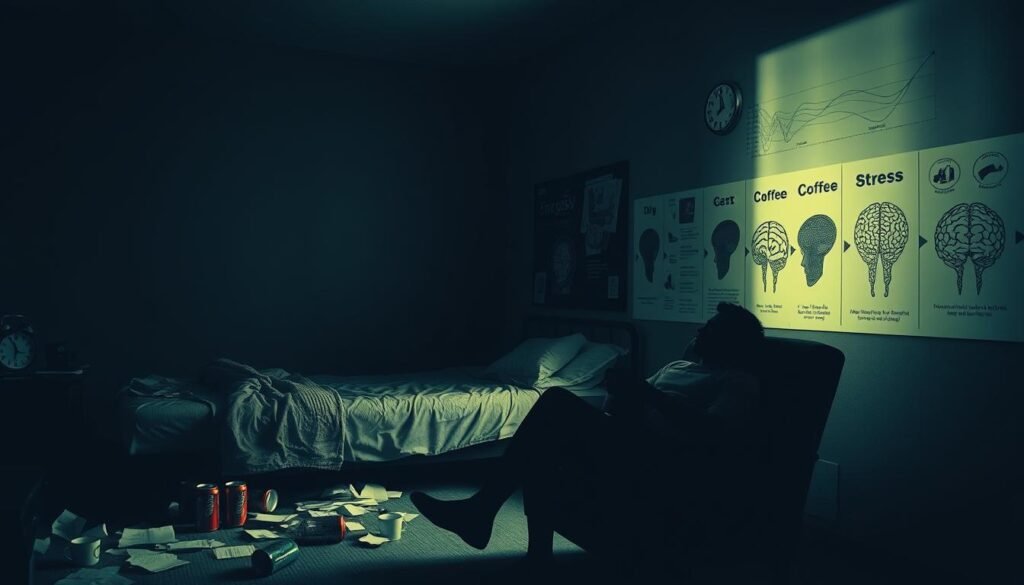About one in three adults in the U.S. struggle with chronic insomnia. This fact underlines the need to grasp how adrenal fatigue affects our sleep. When stress overwhelms our body, it messes up our hormones. This imbalance makes our sleep patterns go haywire. Insomnia does more than make us tired—it also hits our wallets hard.
In this piece, we dive into the roots of adrenal fatigue and how it links to bad sleep. We’ll talk about how treatments like nortriptyline can help. By understanding these issues, you can start fixing your sleep and boosting your health.
Key Takeaways
- Chronic insomnia affects nearly one in three adults in the U.S.
- Adrenal fatigue often stems from prolonged stress and hormonal imbalances.
- The economic burden of insomnia can significantly impact individuals’ finances.
- Understanding the relationship between adrenal fatigue and sleep is crucial for recovery.
- Exploring medical options like nortriptyline for insomnia can be beneficial.
- Recognizing symptoms of adrenal fatigue is essential for effective sleep quality improvement.
Understanding Adrenal Fatigue
Adrenal fatigue refers to a set of vague symptoms caused by too much stress and overworked adrenal glands. These glands make vital hormones like cortisol but can get worn out. This can lead to a variety of health problems. Knowing about adrenal fatigue is important. It helps individuals recognize symptoms and get help.
What is Adrenal Fatigue?
Adrenal fatigue happens when stress goes on for too long. This leads to chronic tiredness and problems handling daily activities. It causes a deep sort of tiredness that rest doesn’t fix. It’s vital to understand and address adrenal fatigue early. If ignored, it could lead to more serious health issues.
Common Symptoms of Adrenal Fatigue
Knowing the symptoms of adrenal fatigue is key to tackling it early. Symptoms include:
- Persistent fatigue: A long-lasting sense of tiredness that doesn’t go away with sleep.
- Brain fog: Difficulty concentrating or focusing on tasks.
- Muscle weakness: Feeling unusually weak or fatigued after minimal exertion.
- Gastrointestinal disturbances: Issues such as bloating or irregular bowel movements.
- Low libido: Decreased interest in sexual activity.
- Cravings for salt or sugar: Increased desire for certain foods, often unhealthy.
Becoming aware of these symptoms is critical. They can greatly affect someone’s life. Early recognition and action are essential.
| Symptom | Explanation |
|---|---|
| Persistent Fatigue | Long-lasting tiredness that does not improve with sleep. |
| Brain Fog | Difficulties in concentration and mental clarity. |
| Muscle Weakness | Feeling weak or fatigued after minimal physical effort. |
| Gastrointestinal Disturbances | Issues like bloating or constipation. |
| Low Libido | Reduced sexual interest and desire. |
| Cravings for Salt or Sugar | Heightened urge for specific unhealthy foods. |
The Connection Between Adrenal Fatigue and Insomnia
Adrenal fatigue affects our sleep in many ways. It leads to troubles like waking up often and feeling tired in the morning. This section delves into how changes in our hormones can mess up our sleep. It pays special attention to cortisol, a hormone, and its role in sleep quality.
How Hormonal Imbalance Affects Sleep
Hormonal imbalances can mess up the body’s natural sleep-wake cycles. When adrenal glands are stressed, they may release cortisol when they shouldn’t. This makes it hard to fall asleep and stay asleep, leaving you feeling exhausted when you wake up.
Cortisol’s Role in Sleep Quality
Cortisol, the stress hormone, can really affect how well we sleep. High cortisol levels can make us feel too alert at bedtime and interrupt our sleep. This makes adrenal fatigue worse. Knowing how cortisol affects sleep can help manage its symptoms and improve how well we sleep.
| Factor | Normal Levels | Adrenal Fatigue Levels |
|---|---|---|
| Cortisol | Varies throughout the day (high in the morning, low at night) | Often elevated throughout the day, suppressed at night |
| Melatonin | Increases during the evening for sleep | May be inhibited by high cortisol levels |
| Stress Response | Well-regulated, promoting balance | Hyperactive response, leading to chronic stress |
Types of Insomnia
Insomnia comes in different types, making it hard for people affected. Knowing these types helps find the right treatment. It’s crucial to know the difference between acute and chronic insomnia. This helps spot symptoms and choose how to make sleep better.
Acute vs. Chronic Insomnia
Acute insomnia starts suddenly and doesn’t last long. It can happen because of stress, hormone changes, or big life changes. People with acute insomnia struggle to sleep well for a short time. On the other hand, chronic insomnia means having trouble sleeping at least three nights a week for three months or more. It often connects to other health issues or hormone problems.

Comorbid and Maintenance Insomnia
Comorbid insomnia is when sleep problems occur with other health or mental issues, making treatment harder. About 40% of people with chronic insomnia also have a mental health condition. This shows the importance of treating both together.
Maintenance insomnia, more common in women, is about not staying asleep. This can really affect someone’s health and daily life. It’s important to find specific ways to help.
If you’re looking for help with insomnia, learning about treatments like amitriptyline might help. You can find more information at this link.
Health Risks Associated with Prolonged Insomnia
Prolonged insomnia affects daily life greatly. It leads to constant tiredness, lack of focus, and getting easily annoyed. These problems can make everyday tasks harder and reduce work or school performance.
Daily Impacts of Sleep Deprivation
Not sleeping enough causes many daily issues. Main problems include:
- Fatigue: Always feeling tired makes doing daily activities hard.
- Decreased Concentration: Having trouble paying attention can hurt how well you do tasks and make choices.
- Mood Disturbances: Not getting enough sleep can make you more likely to get upset or feel emotions intensely.
Long-term Health Concerns
Not taking insomnia seriously can result in big health problems later. Studies have shown key areas of concern, like:
- Cardiovascular Issues: Sleep loss can increase the chances of high blood pressure and heart problems.
- Metabolic Disorders: Insomnia might play a role in getting diabetes by affecting blood sugar levels.
- Mental Health Disorders: There’s a link between not sleeping well and feeling very anxious or depressed.
We need to deal with insomnia the right way. Understanding how lack of sleep affects us and the big health risks involved is vital. This helps us see why it’s important to get help and manage sleep better for our current and future health.

| Health Concerns | Short-term Effects | Long-term Effects |
|---|---|---|
| Cardiovascular Health | Increased heart rate | Hypertension, heart disease |
| Metabolism | Weight gain | Diabetes risk |
| Mental Health | Elevated stress, irritability | Anxiety, depression |
Identifying the Causes of Insomnia
Learning about insomnia causes is key to better sleep. It’s vital to find and treat any medical conditions. Unhealthy lifestyle choices also need to change for better sleep solutions.
Medical Conditions and Insomnia
Many health issues can lead to insomnia. For instance, sleep apnea, anxiety, and depression can make sleeping hard. Drugs like antidepressants, especially SSRIs, might make sleeping even harder. On the other hand, some medications like Mirtazapine can help with sleep. Knowing this helps in getting the right treatment.
Lifestyle Factors That Contribute to Sleeplessness
Certain habits might be causing your sleep troubles. Things like a bad diet, not sleeping on time, and too much stress can be culprits. Too much screen time before bed also plays a part. But, improving sleep habits and maybe trying cognitive behavioral therapy could make a big difference. For anyone facing ongoing sleep problems, useful tips can be found here. It’s important to see how daily actions impact sleep to make positive changes.

| Category | Examples | Impact on Sleep |
|---|---|---|
| Medical Conditions | Depression, Anxiety, Sleep Apnea | Worsened sleep quality, increased insomnia episodes |
| Lifestyle Factors | Poor diet, Irregular sleep schedule, Stress | Difficulty falling asleep, Poor sleep hygiene |
| Medications | SSRIs, Mirtazapine, Diphenhydramine | Can induce insomnia or promote sedation |
Natural Remedies for Improving Sleep
Exploring natural remedies for insomnia can make a big difference in how well you sleep. There are many ways to relax and reduce stress before bedtime. Meditation and changing what you eat can help a lot. These methods improve sleep and make you feel better overall.
Meditation and Yoga Techniques
Meditation is great for sleeping better. It lowers anxiety and helps you relax, so falling asleep is easier. Yoga, especially gentle types, helps release body tension too. By doing these, you’ll feel calmer and get in the right mindset for good sleep.
Dietary Changes to Combat Insomnia
Choosing the right foods is key to beating insomnia. It’s not just about drinking less coffee at night. Eating magnesium and vitamin B6-rich foods like bananas, leafy greens, and whole grains is smart. Cutting back on sugar and junk food also helps since they can mess with your sleep.
| Dietary Changes | Suggested Foods | Impact on Sleep |
|---|---|---|
| Increase Magnesium | Dark chocolate, nuts, seeds | Promotes relaxation and muscle function |
| Increase Vitamin B6 | Fish, potatoes, bananas | Supports serotonin production |
| Reduce Caffeine | Coffee, energy drinks | Minimizes sleep disruption |
| Limit Sugar Intake | Sweets, soft drinks | Reduces mood swings and anxiety |
Nortriptyline for Insomnia: An Off-label Treatment Option
Nortriptyline is an antidepressant known for its sleep-helping powers. It works by affecting brain chemicals critical for mood and sleep. Many say they sleep better with it. Dosage of nortriptyline for sleep must be set right. This reduces bad effects and boosts sleep.
How Does Nortriptyline Work?
This medicine blocks certain brain chemicals from being absorbed too quickly. It’s good for depression and as a antidepressant sleep aid. By improving mood and sleep, it can make days better for those lacking sleep.
Potential Sleep Benefits of Nortriptyline
Some benefits include deeper sleep and fewer wake-ups. People also find it easier to fall asleep. Despite perks, side effects like drowsiness exist.
- Improved sleep quality, allowing for deeper and more restorative rest.
- Reduction in nighttime awakenings, promoting a more continuous sleep cycle.
- Lessened onset time for falling asleep, which can be challenging for those suffering from insomnia.
Noting side effects is key. They can include dry mouth and more.
Nortriptyline Dosage for Insomnia
Dosage of nortriptyline for sleep can range from 25 mg to 150 mg. Talk with a doctor to find your right amount. This personalizes your treatment.
| Dosage Range (mg) | Common Benefits | Side Effects |
|---|---|---|
| 25 – 150 | Improved sleep quality | Drowsiness, dry mouth |
| 25 – 150 | Reduced nighttime awakenings | Dizziness, constipation |
| 25 – 150 | Quicker sleep onset | Blurred vision, palpitations |
Talking to your doctor regularly helps manage side effects. With people reacting differently, tweaking your plan is a must.
Learn more about nortriptyline here.
Creating a Healthy Sleep Environment
Creating a comfortable place to sleep is key. Many people have trouble sleeping because they are too busy. This can mess up how well they sleep. Making your bedroom a better place for sleep can help a lot. It makes it easier to fall asleep and stay asleep. These changes are about more than just comfort. They include ways to relax before bed.
Sleep Hygiene Best Practices
To sleep well, good sleep habits are crucial. Here are some tips:
- Maintaining a calm and dark bedroom.
- Keeping the room cool to facilitate comfortable sleep.
- Avoiding screens and blue light exposure at least one hour before bedtime.
- Incorporating relaxation techniques, such as deep breathing or meditation, to unwind.
Following these tips can lead to a healthier sleep environment. This can improve sleep quality and reduce insomnia.
The Importance of a Consistent Sleep Schedule
Sticking to a regular sleep schedule is very important for health. It helps our body follow its natural sleep patterns. This is crucial for deep, restful sleep. For those with sleep problems, a regular bedtime can make a big difference. It can improve how well you sleep. Keeping a steady sleep schedule keeps you away from the bad effects of not sleeping. This includes being in a bad mood and not thinking clearly.
If you’re having trouble sleeping, there’s help. For specific issues like Alzheimer’s-related sleep problems, talk to a doctor. You can learn more here.
Conclusion
Knowing how adrenal fatigue and insomnia connect is key for good sleep and health. Spotting hormonal imbalance symptoms lets people start managing adrenal fatigue. Making good sleep habits, like a steady sleep schedule, helps sleep get better.
Treatment options like nortriptyline give hope to those fighting insomnia from long-term issues. Though side effects are common, its benefits in boosting norepinephrine and serotonin are important. Working with a healthcare provider helps find the right approach for each person.
Paying attention to sleep health helps beat insomnia and boosts overall health. Taking action and changing lifestyle habits can manage adrenal fatigue well. This improves life quality greatly.